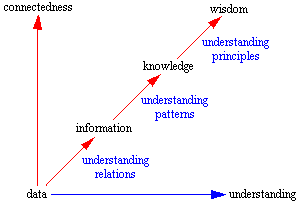| Finding Patterns | 2003-09-28 15:44 12 comments |
 by Flemming Funch by Flemming FunchI'm going to make a more concerted efforts to collect patterns. It is something that well summarizes something I care a lot about. I'm talking about patterns that make things work well, in contrast to patterns that don't work well. Uplifting patterns, transformative patterns, generative patterns, ecological patterns, synergetic patterns. It is an activity that probably doesn't make sense to everybody. A meta level of dealing with the world. But patterns are essentially a way of successfully navigating an otherwise confusing world. A pattern is the way things are arranged. Without worrying too much about the exact things that are arranged, one concerns oneself with the arrangement they're in. Structure as opposed to content. I know that very well from my work as a personal counselor. NLP is essentially all about patterns. Discovering what patterns people think in, and how they do things. And then either using the existing patterns for doing what one really wants to do, or adjusting the existing patterns so they work better. E.g. many people have a pattern in their mind where they make clear pictures of something, and then they get a strong feeling about it, and then they tell themselves things that reinforce a course of action about it. If they make the clear pictures of something they actually want, and they get an energized feeling about it, and tell themselves encouraging things about it, they might be very productive and effective. But if they make pictures of what they don't want, and get freaked out about it, and then feed themselves pessimistic and discouraging statements about it, they might just be a mess. It is the same pattern, but depending on what content you put into it, it might be more or less useful. Procrastination is a pattern that usually doesn't work well. One notes something that needs doing, and one places it out in the future somewhere, and then it feels like one has cleared space for doing something else in the present. The thing to do pops up once in a while, presenting itself with some kind of bad feeling, and one lessens it by again putting it out in the future. One can either change that pattern, by putting things into a different order, or one can use the pattern itself, and, through a kind of mental judo, realize that one can just procrastinate "later". Try it sometime. You can procrastinate tomorrow. Anyway, now I'm also interested in patterns of personal organization, business, and group collaboration. A website has things arranged in a certain way, and that way will greatly influence how people use the site, and what is accomplished. Apparently tiny details that are casually decided at design time might have enormous consequences later. For example, some things I've noticed are: If you make a list of people or weblogs, sorted by update time or popularity or something else like that, people will get into a competitive mode in order to end up on top of the list. And/or others will start feeling differently about the people who happen to be at the top. And I've noticed that if you list a bunch of items, like people or websites or weblogs, in one place, in one list, people will start believing that they have a relation to each other, even if they don't. If you put an item on top of a page, people will consider it more important than it it is at the bottom. Many of these observations are "duh, of course!" kinds of realizations. It is simple in retrospect, but not necessarily in advance. Here's an article: "an Building Communities with Software" by Joel Spolsky about a number of the design issues in community software, which contains many intelligent observations. If you put a button people need to click on at the bottom of the page, below a bunch of entries from other people, it is more likely that those entries will be read. If you send people in e-mail responses they've gotten to messages posted in some forum, it is much less likely they'll go and browse around there. The design choices in Usenet readers makes for long-winded threads that people lose track of the start of. The mechanics of IRC groups makes for lots of effort spent on fighting for specific group names and handles. All because of the patterns things are arranged in. Chris Alexander talked about "Pattern Languages" as it applies to architecture of buildings. And it has spread to software. But we need pattern languages in all aspects of life. There are patterns for organizations, which can be well represented in system diagrams. Gene Bellinger has an exellent page, "Mental Model Musings", containing lots of system diagrams for organizations. Various good people are thinking about Uplift Pattern Languages. For a while I would draw diagrams of patterns I noticed in a book I kept next to my bed, the same that I wrote dreams and good ideas into. I will continue that habit. |